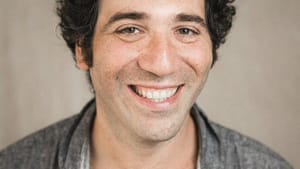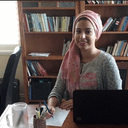Stay in the Loop
BSR publishes on a weekly schedule, with an email newsletter every Wednesday and Thursday morning. There’s no paywall, and subscribing is always free.
Philly’s ‘Radio Silence’ listens to an Iraq that no longer exists

What do you do when the object of your project dies in the middle of it?
That was the question Michael Rakowitz found himself grappling with in August of last year, when prolific Iraqi radio personality Bahjat Abdulwahed passed away.
Abdulwahed — whom Rakowitz describes as the Walter Kronkite of Iraq — was living in the United States as a political refugee at the time. He was the anchor of Rakowitz’s upcoming Mural Arts-produced project Radio Silence, a 10-episode radio series exploring Iraq through the eyes of refugees and veterans of the Iraq War.
But that was not the only complication Rakowitz was up against. In the aftermath of the 2016 elections and the 2017 travel ban targeting Muslim-majority countries, which originally named Iraq as one of the countries whose travelers would be turned back at the border, some of the refugees who’d participated asked Rakowitz to remove their parts for fear of reprisal. Along with Abdulwahed’s death, this left Rakowitz with literal silence where his program was going to be.
Iraq’s “spectral presence”
In some ways, it is almost poetic. The whole reason why Rakowitz embarked on this project in the first place was that he wanted to recreate prewar Iraq through radio.
“The idea was to weave this kind of tapestry that only radio can do . . . that allows the people who are listening to it to weave the patterns and pictures of Iraq from all these different voices,” Rakowitz says.
Mixing English and Arabic, the episodes would offer a “soundscape” including music and other performances, poetry, and stories stretching from Iraq’s culturally rich 20th-century diaspora to contemporary desecrations of war.
“What I think is important is that there’s an utterance of this place or about this place that, really, no longer exists for people because they’ve been torn from it and it’s been torn apart as a country... It’s more of this spectral presence of Iraq,” he says.
A meaningful silence
Despite the setbacks, Rakowitz is determined to move forward — even if the episodes take on a different shape than what he’d initially anticipated or wanted.
“I want to mark their silence in a meaningful way,” Rakowitz says of those who had to drop out of the project. “That becomes a really important part of it, what’s not there and who’s not showing up. It has everything to do with [the fact that] Bahjat is no longer there and the other people from the Iraqi community who were essential to this also have asked for so many of their stories to be withheld.”
“There’s no happy ending here, and that can be hard for people to get their head around because the tendency [is] to want there to be some closure,” he adds.
Fighting the disappearance
Rakowitz is also motivated by his own experiences and memories of his grandparents, who fled Iraq in the 1940s after a two-day spate of violence left many Jews dead or injured. Despite this, they continued to love Baghdad and celebrate Iraqi culture through music and food. That was how Rakowitz knew Iraq until he was 16 years old, when the first Gulf War began.
“The first images I saw of Iraq were these buildings being blown up [through] CNN night vision, and it was really distressing seeing the place that my grandparents fled to destroying the place that they fled from,” he says.
He adds that he’s fighting against the disappearance of “those stories my grandparents told me about this amazing city.”
With Radio Silence, Rakowitz hopes to preserve what he can of Iraq through the unheard voices of those who have been forced to flee.
Radio Silence, produced by Mural Arts and curated by Elizabeth Thomas, will launch with a live performance hosted by Michael Rakowitz on Independence Mall in Philadelphia on July 29 from 6 to 9pm, with a simulcast on PhillyCAM TV. The event, which is free and open to the public, will include a virtuoso Arab music ensemble, storytelling by the local Iraqi refugee community, animal performers, and Iraqi cooking demonstrations and food. Limited seating is available for those who need it; attendees are encouraged to bring their own blankets to the lawn. (Rain date is July 30.)
A 10-episode special radio event will follow, beginning Sunday, August 6, broadcast on WPPM PhillyCAM radio and other community radio stations across the country and distributed nationally by PRX (Public Radio Exchange).
Sign up for our newsletter
All of the week's new articles, all in one place. Sign up for the free weekly BSR newsletters, and don't miss a conversation.

 Nadia Eldemerdash
Nadia Eldemerdash